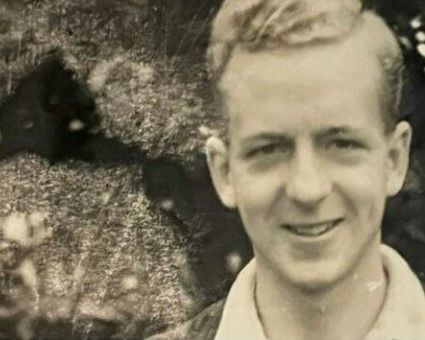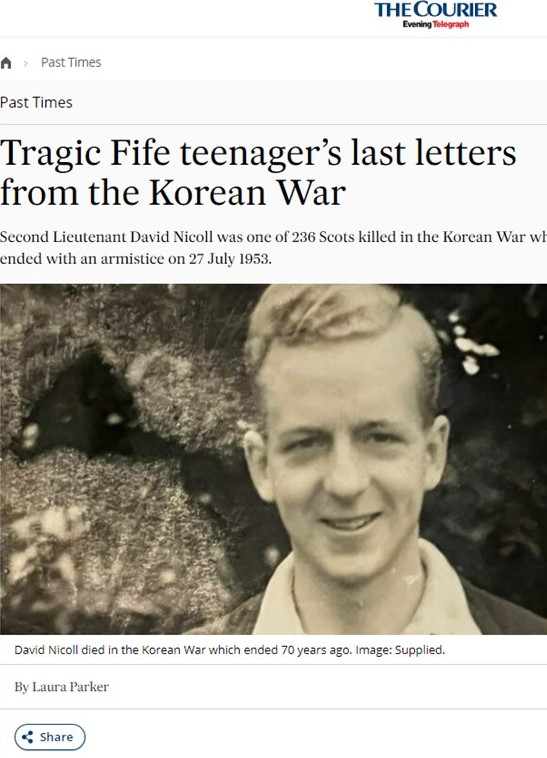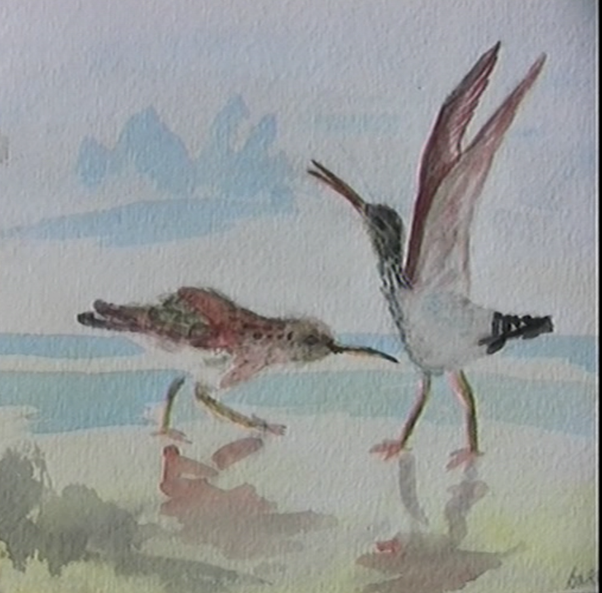
Last letters from a forgotten war

‘This has been an experience, alright.’ How recently-discovered letters to a sister in Edinburgh have breathed new life into a young Scottish casualty of the Korean War, which ended 70 years ago this month.
John Nicoll was home alone in Wardlaw Gardens, St Andrews, on 9 August 1952 when the telegram for his parents arrived. DEEPLY REGRET TO INFORM YOU…THAT YOUR SON 2/ DAS NICOLL WAS KILLED IN ACTION IN KOREA… For several hours John had to live with the knowledge that it would fall to him to tell his mother and father that his brother and their third child would never be coming back.
Second Lieutenant David Nicoll was one of 236 Scots killed in the Korean War, which ended with an armistice on 27 July 1953. He had nearly completed his National Service with The Black Watch 1st Battalion when, in March 1952, he volunteered for a five-month extension to go with them to Korea, deferring his place at Cambridge. He was, effectively, on his gap year. He died exactly two weeks after turning 20, and a day before they were due to leave the front.
The Korean conflict is the ‘forgotten war,’ sandwiched between WW2 and Vietnam. It lasted three years (1950-53) and left the Korean peninsula much as it had been before it started: divided at the 38th parallel. The Black Watch was one of three Scottish regiments sent out to join UN forces from over 20 countries in defending South Korea after its invasion by the North in 1950.
In that same year, National Service was increased from 18 months to two years. Over half of the 86,000 British soldiers serving in Korea were, like David, on National Service, with no intention of becoming regular soldiers.
Last winter the Black Watch Museum in Perth put on a small display that told the story of the Korean War, David’s part in it, and his death. Having told the rest of the platoon to stay back for safety, he was killed in a minefield while mending the perimeter fence. The record shows he was killed by a wound to the head, presumably by a sniper. The museum displayed his red hackle (the spray of feathers worn on Black Watch bonnets), his last letter to his parents, and that fateful telegram.
David Nicoll is named with the rest of the fallen in the pagoda that forms the Scottish Korean War Memorial at Torphichen in the Bathgate Hills near Linlithgow. His name is also carved high up on the Armed Forces Memorial in Staffordshire which records those killed whilst serving since 1948.
The military is very good at remembrance, but it means that those who have served are forever seen as soldiers. Earlier this year I gained a greater insight into the real David through five letters he wrote to his older sister, my mother Elspeth. Discovered while clearing out my late father’s house in the Borders, they are dated between March and August 1952, from embarkation on the troop ship HMT Empire Orwell to his last note from the front line. Along with a collection of watercolours of Argyll landscapes and exquisite bird sketches made during a teenage trip to the Western Isles – he was a keen birder – they reveal much more about a young man on the brink of life. Together they chart his unwitting progress from youthful life to early death.
On 16 March he writes about his decision to sign up: ‘You may have heard of my madness, but it is only five months which is just enough time to get out there and come back. There is absolutely no possibility of signing regular.’ He ends: ‘Daddy doesn’t seem to approve of my decision. I didn’t really expect him to!’ In the letters that follow, he continues to be nonchalant about his service. Although he was nominated by the NCOs as the best potential officer, he loves to give his sister the impression that it is all a bit of an adventure – perhaps to reassure her. He calls the voyage out ‘a Cook’s Tour to Pusan’, and writes from the ship, the HMT Empire Orwell, that he has had ‘not a moment of regret – yet.’ He reckons the ship’s company was pleased to see the last of the Black Watch as there was ‘no regulation we did not break.’
By 27 June, he is five miles behind the line, but still being chipper for his sister, even though the big guns are on the other side of the hill: ‘…just like cadet camp, but with noises off!’ he writes, jauntily.
He gives a description of a typical day, involving ‘bashing up and down hills in full kit’ and ‘demonstrations on mines and booby traps – all rather uninteresting and tiring when the temperature reaches 100F.’
On 6 July there is a casual mention of taking a recce party ‘up the line tomorrow’ and being there ‘until August sometime.’ ‘Of course this is all secret,’ he confides, ‘but I am told letters are not censured.’
Even in his last letter, when they are ‘the furthest-forward platoon in the Commonwealth Division – right at the sharp end’ (Point 159); when it has rained for four days solid and everything is caked in mud; when the water is dripping into his dugout ruining the previous long letter he had written to Elspeth so he has to start one again on borrowed paper, he takes his military service lightly. ‘All that happens,’ he writes, ‘is that the company commander gives me a severe rocket every now and again for general inefficiency,’ adding cheerfully, ‘that’s just one of the things that keeps life going.’
Four days later he was dead.
Along the way his letters have charted both the discomforts and the surprising luxuries. At five miles behind the line, he is woken with a cup of tea before a breakfast of fruit juice, porridge, bacon and egg, toast and marmalade. At lunchtime, the ‘Jocks’ (soldiers) go for lunch and the officers head to the mess, where they are beginning to rack up huge bar bills – ‘almost unrepayable’ – by drinking expensive squash and beer in place of the unpleasant chlorinated standard-issue water. Gin is relatively cheap at sixpence. Even right on the frontline, he writes, surely tongue-in-cheek, that ‘there are no women here or social gatherings here… just the normal gin parties when majors hang around with little to do.’ Discomforts are handled lightly: pushing their way through the undergrowth in extreme heat, everything caked first in dust, then mud. Some minor hardships are mentioned briefly – he has not heard the wireless, seen a film or flushed a toilet for weeks. But he would like to have some camera film sent out. ‘I should have some good photos in the film I’ve just finished and I must get some more up in the line.’ His longest, penultimate, nine-page letter to Elspeth is written sitting on a beer crate by candlelight as the heavy seasonal rains start again, turning everything to ‘two to three feet of mud.’
There are detailed descriptions of daily routine, which according to this Second Lieutenant includes a great deal of platoon inspection, particularly checking for blisters and whether socks need washing and darning. ‘They say an army marches on its stomach but believe me I march on my feet!’ There are also weapons inspections, smearing of kit with mite repellent, and paladin anti-malaria pills to be taken.
Throughout the letters there runs a young man’s normal longing for a social life. On the voyage out he enjoys dancing with a secretary from the Hong Kong war office and regrets that there are not more women available: ‘Unfortunately all the wives are married, if you know what I mean.’ He asks to be remembered by those back home, including a June Morrison and ‘Buffy’, even though ‘she pretends not to know my address.’ His final thoughts in his last letter are for the girls in Edinburgh. He notes that he did, eventually, get ‘a very nice letter’ from Buffy.
He concludes: ‘This has been an experience all right but I won’t be sad to board the ship again.’
He never embarked on that ship. No part of David ever returned to Scotland. He is buried in the United Nations Memorial Cemetery in Busan (formerly Pusan, his imagined Cook’s Tour destination), South Korea.
We will never know how his life might have turned out had he made it home. David could even now be a sprightly ninety-one-year-old, still bird-watching, painting, and enjoying a gin tipple. His elder brother John asserted that he would have been another Peter Scott or David Attenborough. Of course, all sorts of life’s other disasters could have got to him. But artistic talent is rarely lost and the qualities noted when he was posthumously awarded the Elizabeth Cross and scroll at a ceremony in Ayr in 2011 – his ‘charm and good manner’ and ‘constant unselfishness which never lost him a friend he had made’ – are also likely to have been consistent over a lifetime.
RIP David, and all the other young men who were lost in the Korean War.
© Laura Parker 2023
A version of this story was published in The Courier on 27 July 2023
